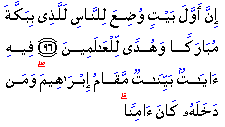General
From Issue: 258 [Read full issue]
| Living the Quran |
Al-Imran
(The House of Imran)
It was in Makka that Ibrahim and his son built the Holy Kaba, the centre of the Islamic movement, on a site chosen by Allah himself. This building was not intended for worship only, as mosques are; its purpose was to act as the centre for spreading the universal movement of Islam, a world-wide gathering point for believers in the One God to assemble to worship Allah in congregation and go back to their respective countries carrying with them the message of Islam. This was the assembly which was named Hajj. Peace always reigned in and around the Kaba, when all around it were rampant plunder, murder, devastation, conflict, and warfare - such was its sanctity that even the Bedouins who respected no law, if they detected in its precincts the murderer of even their father, did not dare to touch him. Source: |
| Understanding the Prophet's Life |
The Legacy of Truth and Tolerance Ali Ibn Abi Talib reported, "When I took possession of the weapon of the Messenger of Allah, peace be upon him, I found it the hilt of the sword a parchment saying, 'Keep relations with those who cut you off, behave well towards those who treat you badly, and speak the truth even if it is against yourself.'" [As-Saheehah of Abu Amr Ibnus Sammak] Twentieth century media has tried to project Islam and Muslims as intolerant fundamentalists, but the truth of Allah's revelation stands clear from falsehood. This Hadith clearly directs the Believers who will receive this legacy through Ameer-ul-Mumineen, Ali Ibn Abi Talib, to deal with all people in tolerance, forgiveness and truth. Islam is not a religion of aggression and terror. Muslims should maintain their ties with those who oppose them or refuse to accept Islam. People who have newly accepted Islam and still have non-Muslim families should keep the love of their parents in their hearts and the respect for their family members in their dealings. Yes, we do not follow their belief system, but we recognize the connection of birth and blood ties made by the Creator. Maybe that warm connection and a loving example of Islam could lead to their acceptance of Islam, by Allah's permission. The Prophet Muhammad was tortured by the people of Makkah and At-Taif but he forgave them, had patience with them and lived to see them enter Islam in crowds. This legacy, also, gives us a powerful lesson in conflict resolution. One of the greatest obstacles in the path of progress is disunity, but many of our differences and misunderstandings could be overcome if we would speak the truth at all times and recognize our brothers and sisters in Islam, if they are correct. Humility before Allah and other Muslims is not a weakness but a source of power that can cement our ranks and lead to healthy, fruitful relations. Source: |
| Blindspot |
Mass Culture The subject of any culture is man as an individual, as a personality, as the "unrepeatable individuality." The subject or object of mass culture is a mass or a "man-mass." A man has a soul; a mass has nothing but needs. Therefore, every culture is a bringing up of man, while mass culture is just a supply of needs. Culture tends toward individualization; mass culture leads in the opposite direction, to spiritual uniformity. At this point, mass culture diverges both from ethics and from culture. The mass production of "spiritual goods," the copies, the tawdry and worthless literature, leads to impersonalization. Mass culture, as distinguished from authentic culture, limits human freedom by just this "uniforming" tendency since "freedom is resistance to uniformity." "Mass" psychology proved, and practice confirmed, that it is possible by persistent repetition to convince people of myths which have nothing in common with reality. The psychology of mass media, especially of television, has been conceived in such a way as to subordinate not only the conscious but even the instinctive and emotional side of man and to create in him the feeling that the imposed opinions are his own. Source: |
| Cool Bits! |
The first 10 days of Zul Hijjah: why they matter Even for those not performing the pilgrimage, Hajj, the first ten days of this month are considered very sacred and a time for increased reflection, seeking Allah's forgiveness, doing good and various other forms of worship. Prophet Mohammed (peace and blessings be upon him) has said about the first ten days of Zul Hijjah: There are no days in which righteous deeds are more beloved to Allah than these ten days." The people asked, "Not even Jihad for the sake of Allah?" He said, "Not even Jihad for the sake of Allah, except in the case of a man who went out to fight giving himself and his wealth up for the cause, and came back with nothing (Bukhari). So sacred are the first ten days of Zul Hijjah that Allah swears an oath by them when He says in the Quran: "By the dawn; by the ten nights" [al-Fajr 89:1-2]. Swearing an oath by something indicates its importance and great benefit. Source: |
